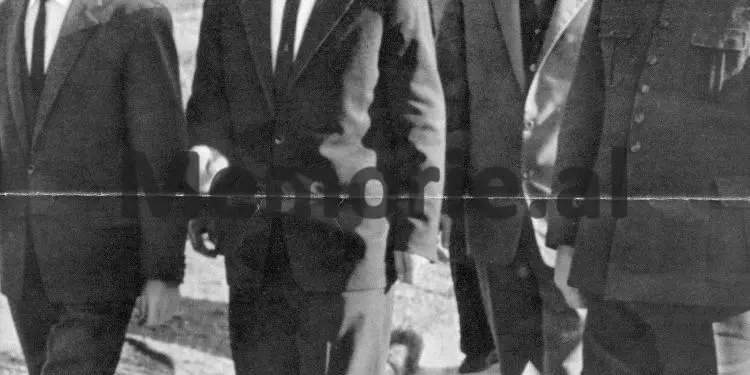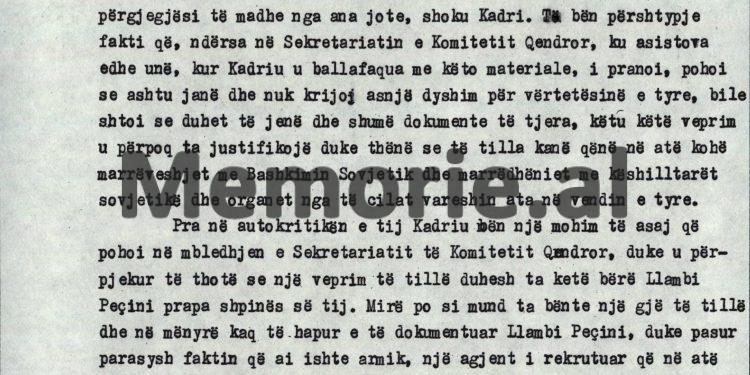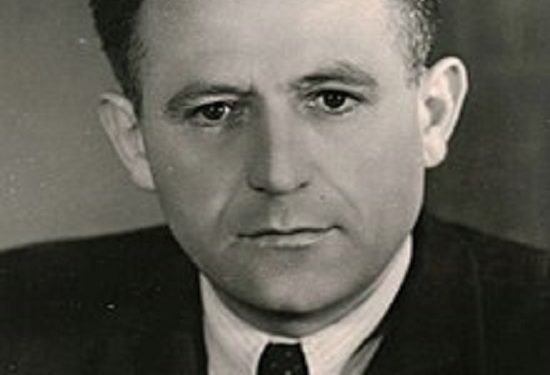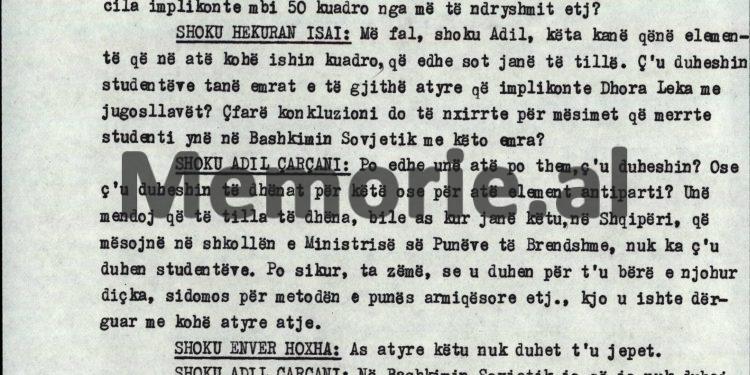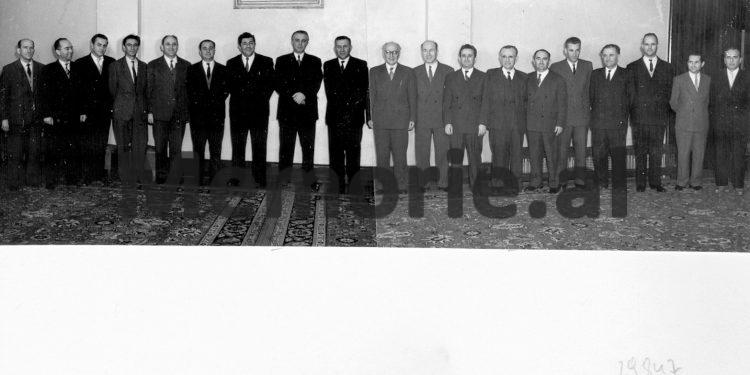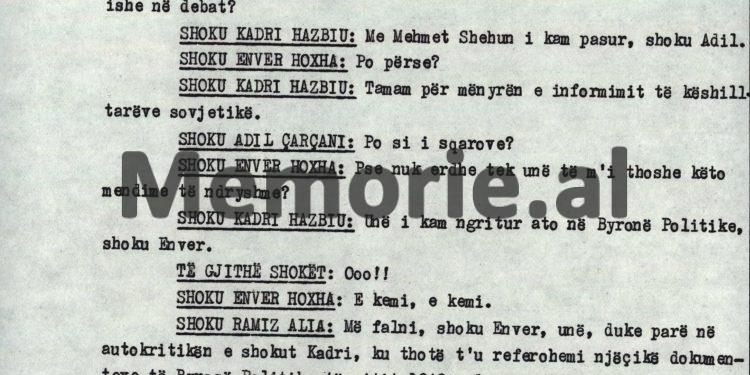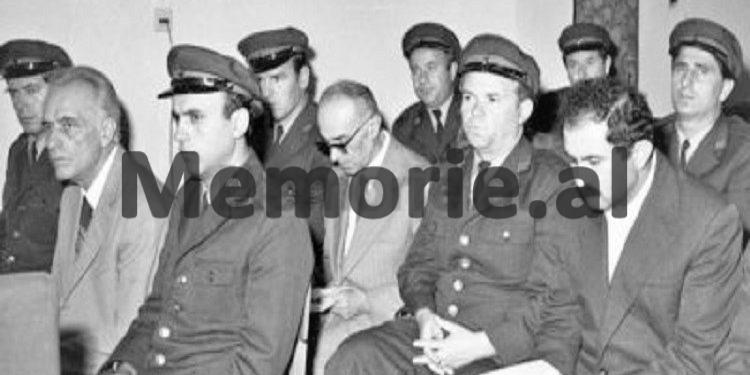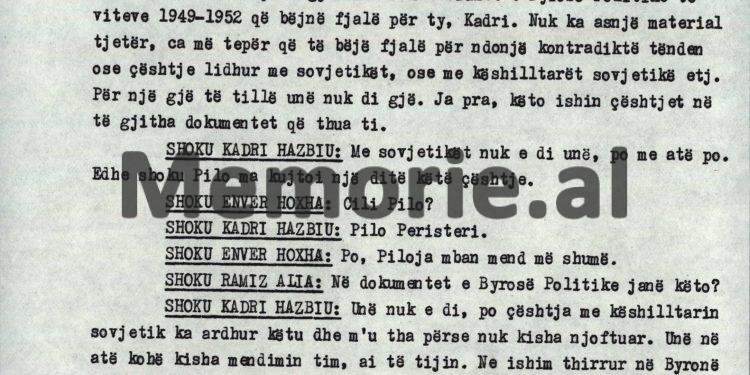Dashnor Kaloçi
Part twenty six
Memorie.al/publishes some archival documents extracted from the Central State Archive in Tirana (the fund of the former PPSh Central Committee), which belong to the year 1982, where there is a file with relations, reports, instructions, information, letters, minutes of meetings of the Political Bureau, the Secretariat of the Central Committee, etc., regarding the “hostile activity” of the member of the Political Bureau and the Minister of People’s Defense, Kadri Hazbiu, as well as some of his closest collaborators, such as : Feçor Shehu, Mihallaq Ziçishti, Llambi Peçini, Zoi Themeli, etc., who were accused by Enver Hoxha, as “the main collaborators of the police agent Mehmet Shehu”. In the file in question, there is also a document with Kadri Hazbi’s self-criticism, dated September 27, 1982, sent to Enver Hoxha and the Political Bureau of the Central Committee of the PPSh, regarding “his poor work at the head of the Ministry of of Internal Affairs and the lack of vigilance, for not detecting hostile groups, all of which the party and Comrade Enver had discovered”. In this document, the former head of the Ministry of the Interior writes: “From the beginning of September, when I was getting my hair cut, a driver who works with the transport lines abroad came to me and told me that, returning from abroad, the drivers they had spoken badly about my fate. I didn’t ask him what he had been told, but I told him to go and report it where it should be. He added in more detail that he had spoken to the companion who stays with me, which I ordered him to report. He told me that he had done this. I don’t know whether I told him about this case or not, friend Hekuran. After a few days when I returned from a 3-4 day service, my family told me for the first time that they are taking us on the phone and so on, in meetings they ask about you, where are you and how are you, because we have heard things not good, as if we have escaped as a family abroad, as if I have been dismissed from my position as Minister of Defense, etc. I told you that anyone who asks about us, you say we are fine and don’t engage in further conversation. I emphasize that these things have spread so much that even one of the workers who serves in my family left without expecting that something is happening with me and my family. All these things, I told my friend Ramiz, together with my opinion that there is not enough fight against these harmful slogans and that they are spreading from Tirana in the first place”. Likewise, the document in question also contains the minutes of the meeting of the Political Bureau of the Central Committee of the PPSh, held on October 8, 1982, where the “hostile activity of Kadri Hazbi” from the period after the war when he was in the position of Chief of Army Security, which has brought fierce debates, they all discussed, starting from: Adil Çarçani, Hekuran Isai, Simon Stefani, Manush Muftiu, Rita Marko, Prokop Murra, Photo Çami, Lenka Çuko, Pali Miska, Besnik Bekteshi, Muho Asllani and Llambi Gegprifti. Even the debates and strong tones in that meeting were not absent between Enver Hoxha and Kadri Hazbiu, which continued throughout the meeting, for several sessions. But for more about these, we know the document, which is published for the first time by Memorie.al
Continues from last issue
The document with the minutes of the meeting of the Political Bureau of the Central Committee of the PPSh, held on October 8, 1982, where the “hostile activity” of Kadri Hazbi was analyzed
ALBANIAN LABOR PARTY TOP SECRET
CENTRAL COMMITTEE
RECORDS
OF THE MEETING OF THE POLITICAL BUREAU OF THE PPS CENTRAL COMMITTEE ON OCTOBER 8, 1982
Agenda:
- Discussion on the serious words of friend Kadri Hazbiu
- Approval of the report on transport to the plenum
All members of the Political Bureau are present at the meeting.
DEVELOPMENT OF THE MEETING
The meeting was opened and led by the first secretary of the Central Committee of the PPS, Comrade Enver Hoxha.
Discussion on the serious crimes of comrade Kadri Hazbiu.
COMRADE RAMIZ ALIA: In its meeting of November 16, 1951, the Political Bureau of the Central Committee of the ALP gave punitive measures to Kadri Hazbiu, Josif Pashkos, Mihallaq Ziçishti, Maqo Çomos, and Zoi Themeli, because they admitted that to go to dinner with the full-power ambassador of Romania in Albania, without informing the leadership of the Party, and their immediate superior, this problem appears in the documents of the Political Bureau. The second problem is for a mistake made by Kadri Hazbiu, as the first Deputy Minister of the Ministry of Internal Affairs, who did not immediately notify the former minister of that time, Mehmet Shehu, about information discovered by the Security that was being investigated regarding the position of reaction which, intended to carry out an assassination attempt against Comrade Enver Hoxha, the Political Bureau in its meeting dated 16.8.1952, criticized and also drew Kadri’s attention.
Only these two Politburo documents have been found in the 1949-1952 fund and are about you. There is no other material and nothing more to say about any of your contradictions or matters related to the Soviets or their advisers. I know nothing about such a thing. So, these were the issues in all the documents you mentioned.
COMRADE KADRI HAZBIU: I don’t know about the Soviets, but I do about them. Comrade Pilo also reminded me of this issue one day.
COMRADE ENVER HOXHA: Which Pilo?!
COMRADE KADRI HAZBIU: Pilo Peristeri.
COMRADE ENVER HOXHA: Yes, Piloja remembers a lot.
COMRADE RAMIZ ALIA: In the documents of the Political Bureau, are these?!
COMRADE KADRI HAZBIU: I don’t know, but the issue with the Soviet adviser came here, and I was told why I hadn’t notified. At that time, I had my opinion, while he had his. We were called to the Political Bureau at that time, and I stayed in the anteroom for about half an hour until the comrades were consulted. Then I even asked to be removed from the State Security for this reason and this is a fact.
The issue was not related to Mehmet Shehu, but to the fact that the Soviet adviser was seeking details regarding information. I told our friend who was there not to give him this information as we had already given it to him. I considered this matter closed, but the adviser had gone to Mehmet Shehu and complained, and he called me and asked me why I had not informed the Soviet adviser in detail, drawing my attention to the lack of correctness.
COMRADE ENVER HOXHA: Why didn’t you tell Mehmet Shehu, that you said all this in the Ministry of Internal Affairs?!
COMRADE KADRI HAZBIU: Yes, he knew that.
COMRADE ENVER HOXHA: You should tell him this, despite the fact that he knew, since the occasion came to ask you about the tip of the ear. However, this does not matter.
COMRADE KADRI HAZBIU: He, in this case, was looking for exactly that. No Comrade Enver, because we came to the Political Bureau at that time and I am convinced that he came specifically for this issue.
COMRADE ENVER HOXHA: More, here is the Politburo document.
COMRADE KADRI HAZBIU: I remember that the meeting of the Political Bureau was held at that time upstairs in the Palace of Brigades.
COMRADE ENVER HOXHA: Remember that you have a good memory, since you came to me in Dajt and I don’t know the date. But I have a good memory, not for anything else, but because I have the facts written down. You told us that you came at that time with Mehmet Shehu, but he was not with you and you came with Beqir Balluk.
COMRADE KADRI HAZBIU: Comrade Kadri Hazbiu: I don’t remember now, Comrade Enver.
COMRADE ENVER HOXHA: You don’t remember, but the notebook I have does, and that’s for sure.
COMRADE KADRI HAZBIU: I remember that he came to you then.
COMRADE PALI MISKA: Why, you don’t remember when you left and when you entered.
COMMAND KADRI HAZBIU: When, where did I go?!
COMRADE PALI MISKA: And when you arrived, did you enter any office?!
COMRADE LENKA CUKO: But why don’t you go in, in this case, to some docudo office?!
COMRADE KADRI HAZBIU: How many times have I gone to Comrade Enver?!
COMRADE PALI MISKA: No, how can you not remember, but how can you remember when you say I went?! Do you remember this incident with him?
COMRADE ADIL ÇARÇANI: You say that on many issues you had different opinions with Mehmet Shehu, among others, on the issue of informing the Soviet advisers, but you don’t tell us on what issues you had objections, with which you had these opinions different, and where did you put them?!
COMRADE KADRI HAZBIU: I want to say one more thing, Comrade Adil, that for all these issues I bear responsibility for being broken.
COMRADE ADIL CHARCANI: Well, why didn’t you go to the Central Committee of the Party?! What you are doing is again an attempt to avoid your responsibility.
COMRADE KADRI HAZBIU: No, it says that I am broken (he gets so angry that the words are not understood at all).
COMRADE ENVER HOXHA: Look Kadri, leave the aggressiveness here.
COMRADE KADRI HAZBIU: Me, huh?!
COMRADE ENVER HOXHA: He who has committed a crime must lower his head. Aggressiveness does not pass in our Political Bureau.
COMRADE KADRI HAZBIU: Yes, I am not for this, Comrade Enver.
COMRADE ENVER HOXHA: No, you are not, but you are, because I see how you are answering here, trying to cover the blame.
COMRADE KADRI HAZBIU: Yes, what is being said is serious, Comrade Enver.
COMRADE ENVER HOXHA: Yes, it is very heavy, and you must understand that it is very heavy. And if you didn’t understand that, you’re done. I speak Albanian, that’s how this matter is.
COMRADE KADRI HAZBIU: It is serious, Comrade Enver, that the problem is being presented here as if I acted on purpose.
COMRADE ENVER HOXHA: Well then, we are thinking in our own way, while you think in your own way. But in the end, we will vote according to our opinion, and we do not agree with you at all.
COMRADE KADRI HAZBIU: I am as the Political Bureau will be, as the Party decides.
COMRADE ENVER HOXHA: Well, you say in words how the Party will decide, but you must be convinced of what the Party will decide. That the Party always decides correctly.
COMRADE KADRI HAZBIU: I know how the Party will decide. But I have a prayer here, so that I will not be called a traitor.
COMRADE ENVER HOXHA: How, how?!
COMRADE KADRI HAZBIU: Not to be called a traitor. Let my responsibility be complete.
COMRADE ENVER HOXHA: No, in this way I do not accept what you say. I am not convinced that you said “let my responsibility be full”.
COMRADE KADRI HAZBIU: No, I am responsible.
COMRADE ENVER HOXHA: If your responsibility is complete, then why are they considered traitors and you are not?!
COMRADE KADRI HAZBIU: I’m sorry, Comrade Enver, but they are traitors because they did all this activity with conscience.
COMRADE ENVER HOXHA: Well, we didn’t put anything on you; you yourself are putting this epithet on yourself.
COMRADE KADRI HAZBIU: I am putting it, because this is how the questions are being directed to me, Comrade Enver.
COMRADE ENVER HOXHA: How to put the questions, that you are a traitor?!
COMRADE ADIL CHARCANI: No one told you anything about this.
COMRADE ENVER HOXHA: You, Kadri Hazbiu, are demanding an account here and are attacking.
COMRADE ADIL ÇARÇANI: And why do the Russians have all these highly secret documents then?!
COMRADE ENVER HOXHA: Hey, answer me, why?!
COMRADE KADRI HAZBIU: Yes, Comrade Enver, this is how I found this practice, since that was the level of our relations with them at that time.
COMRADE ADIL ÇARÇANI: It is not true that you found it like that, that it is the document.
COMRADE ENVER HOXHA: No, you didn’t find it like that at all, but you found it differently.
COMRADE HEKURAN ISAI: We said it and read it, we can read it again if you want, but in 1955 these things were done.
COMRADE ENVER HOXHA: I think you don’t need to read it, because they were read once.
COMRADE KADRI HAZBIU: Look at the documents again, they are there.
COMRADE HEKURAN ISAI: Yes, here they are, here is this?
COMRADE ENVER HOXHA: Please continue the discussion, Comrade Adil.
COMRADE ADIL ÇARÇANI: I think that you, in fact, completely agreed with that way of working as it was done in the Ministry of Internal Affairs, regarding the large and unlimited information that you gave to the Soviet Security bodies, without their knowledge, even behind the Party. For this there are facts here, there are documents, but logic also speaks. If there are other issues, stand up and say that you are correct in this matter, and allow us to refer to these facts.
We criticize you that these facts that have come out are very important. We must necessarily refer to the facts, the black and white; we will refer to the documents, at the same time also to logic, when we see that you do not say anything to the Party. Tell the truth to the Party, as things are likely, that I myself have many doubts about you, I do not believe in your sincerity in these matters and I have no way of trusting you. Therefore, I will definitely refer to these issues. Considering the causes of heavy responsibility related to these actions, you make efforts here to reduce your responsibility and share it with others.
In your self-criticism, you often use the expression: “I tell the Politburo honestly”, while I have the right to tell you that it is precisely the lack of sincerity that characterizes your self-criticism. Not only do you not satisfy and help the Politburo, but you are making your responsibility and guilt as a member of the Politburo even heavier, in connection with the very delicate central functions you had and have. In the synoptic picture, “On the wild hostile activity of Mehmet Shehu”, that Comrade Enver presented to the Political Bureau and the Plenum of the Central Committee of the Party, it was clear that in the Ministry of Internal Affairs, just like in the Ministry of People’s Defense, they had infiltrated many enemies and agents of foreign services in responsible countries, and who were collaborators of Mehmet Shehu and were directed by him for his conspiratorial purposes against the Party, the Government, and Comrade Enver.
These conspirators have been operating for a long time in the Ministry of Internal Affairs, seriously damaging the interests of the Party and the People with their dangerous activity, in various ways and forms, according to the instructions of the CIA, KGB, UDB, etc. Thus, they had turned the function entrusted to them into an agentive and conspiratorial activity. These sworn enemies worked for a long time and without being dictated by the very fact that they found a suitable ground, especially in the pronounced lack of vigilance, especially due to sick familiarity, and sentimentality, in the ranks of cadres of the Ministry of Internal Affairs, including comrade Kadri Hazbiu himself. Memorie.al
The next issue follows




